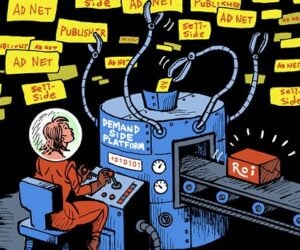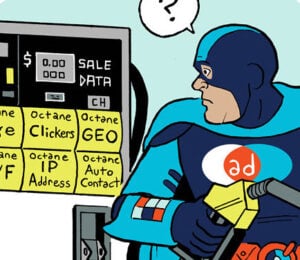Many CTV advertisers are buying a lot of inventory that might not fit their personal definitions of CTV.
Streaming ads that play on smart TV sets in living rooms are just part of the overall CTV media mix. These placements are sold alongside “sorta CTV” inventory, like streaming apps on phones and tablets, digital out-of-home (DOOH) screens in bars and restaurants, point-of-sale tablets and even online video.
An ad tech startup called CleanTap wants to separate the wheat from the chaff in CTV by serving as a curation layer between DSPs and SSPs. The idea is to filter any CTV placements that don’t meet the advertiser’s expectations out of the inventory pool before there’s a bid, said CleanTap Co-Founder Shailin Dhar.
CleanTap claims its tech filtered out 85% of CTV impressions as invalid or miscategorized in early tests.
Filtering the programmatic pipes
In addition to Dhar, an ad verification OG who previously founded Method Media Intelligence (MMI), CleanTap was co-founded by Will Rand, a 15-year publisher ad ops veteran and a former CTV buyer for Fortune 500 brands, and Jenna Martinez, a clinical psychology researcher who leads the company’s attention modeling efforts.
The company, which has less than 10 full-time employees, pitches itself as a filtration system for the so-called pipes through which programmatic demand flows. CleanTap operates an ad exchange, has seats on various SSPs and conducts post-auction log file analysis.
For each of those services, CleanTap claims to eliminate undesirable CTV inventory early in the auction process. Which is a break from most of the innovation happening in the ad verification space, Dhar said. Rather than “creating sophisticated technology to do filtration between the cup and your mouth,” he said, CleanTap wants to ensure “we just have clean water in the cup.”
Platforms that have partnered with CleanTap so far include Magnite, Nexxen, Microsoft Advertising and Colossus SSP.
Although Colossus SSP came under fire last year for allegedly misdeclaring IDs in its bid requests, CleanTap doesn’t actually touch that part of its business, Dhar said. The Colossus inventory in question was not CTV inventory, he said, and CleanTap believes the fault lies with Colossus’s traffic management partner, BidSwitch.
(BidSwitch’s parent company Criteo provided the following comment from its general counsel Ryan Damon: “Any claims or implications that BidSwitch is to blame for Colossus SSP’s manipulation of the content of bid requests are untrue.”)
Plus, CleanTap does not transact on audience identifiers provided by SSPs, but on user agents, device types and content signals included in the bid requests, he added.
An r/adops origin story
CleanTap was created in 2024 with two questions in mind, Dhar said: “What kind of ad traffic would a premium TV buyer want? And what kind of filtration can be done to bid requests to make sure you’re only getting what you consider premium?”
The company’s definition of premium CTV narrowly focuses on smart TV sets located inside homes that are running connected TV apps. It does so by verifying the device type and by ensuring that the device is connected to a home internet service provider.
DOOH placements and mobile streaming devices need not apply. Not even TVs equipped with external streaming devices fit the company’s criteria. And CleanTap also rules out participatory content that might be running on a TV set, like video games, because it’s only interested in the traditional lean-back TV viewing experience.
Although the company formally incorporated in early 2025, Dhar and Rand originally connected around 2016, in a Reddit r/adops thread Rand had posted about how advertisers can protect themselves from invalid traffic (IVT). One poster in the thread replied that the IVT problem was worse than Rand realized; that poster turned out to be Dhar.
“I was like, ‘Why do you think I’m full of crap?’” Rand recalled. “And he was like, ‘Because I used to work at a company that buys invalid traffic and runs ads on bullshit websites, and we always get paid.’”
Dhar and Rand then collaborated on secret ad shopper reports in which they spun up IVT-heavy sites and tried purchasing impressions from those sites using auction seats on SSPs. This research in part led Dhar to launch MMI in 2021.
Curating CTV
However, MMI folded in 2023 due to difficulties competing with incumbent verification platforms while the market recovered from the COVID-19 pandemic, Dhar said. So he, Rand and Martinez decided to launch CleanTap as a verification solution specifically focused on the booming CTV channel.
The startup is also capitalizing on the deal curation trend sweeping programmatic advertising, Dhar said. The company found limited success partnering with DSPs and SSPs to create pre-verified private marketplaces because some platforms won’t share log file data, he said. So it built its own solution.
In addition to acting as a curator for its SSP partners, CleanTap operates its own ad exchange, which allows the verification process to happen before the ad auction is held, Dhar said.
It’s unusual in ad tech for companies to restrict the flow of supply, Dhar said. But there’s a shift happening in the industry where some marketers are moving away from scale for scale’s sake and focusing more on media quality.
That being said, Dhar added that there’s not yet a critical mass of CTV buyers rightly concerned with media quality. But, he said, “you can have a few progressive clients that do innovative things and build a business around that.”
CleanTap’s revenue model is margin-based, with income coming from the difference between publisher floor prices and the CPMs advertisers are willing to pay for curated inventory.
When it comes to its developing publisher-side business, CleanTap wants to help the CTV channel avoid the muddying of inventory quality that’s driven down CPMs for online display and video, Rand said.
“CTV might be the last best shot a publisher has to make real money in this industry,” he said. “If we allow all this stuff to be sold as CTV, then CTV is going to go the same way as online video.”
Update 8/7/25: This article was updated to add a comment from BidSwitch parent company Criteo.














